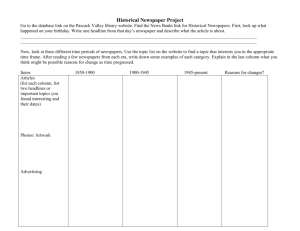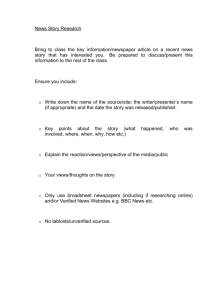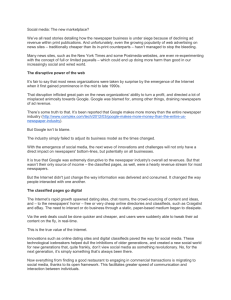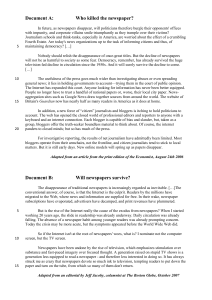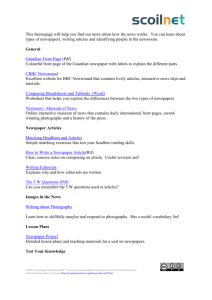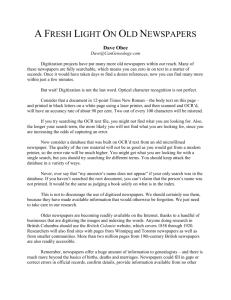History, Philosophy and Newspaper Library Annual Report
advertisement
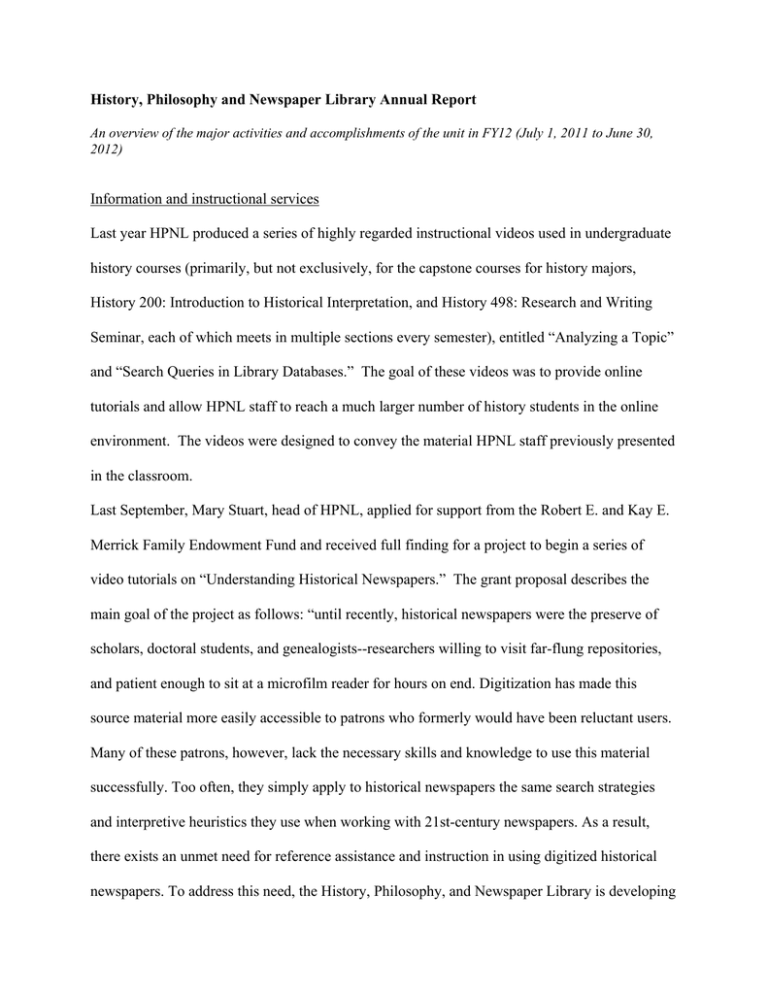
History, Philosophy and Newspaper Library Annual Report An overview of the major activities and accomplishments of the unit in FY12 (July 1, 2011 to June 30, 2012) Information and instructional services Last year HPNL produced a series of highly regarded instructional videos used in undergraduate history courses (primarily, but not exclusively, for the capstone courses for history majors, History 200: Introduction to Historical Interpretation, and History 498: Research and Writing Seminar, each of which meets in multiple sections every semester), entitled “Analyzing a Topic” and “Search Queries in Library Databases.” The goal of these videos was to provide online tutorials and allow HPNL staff to reach a much larger number of history students in the online environment. The videos were designed to convey the material HPNL staff previously presented in the classroom. Last September, Mary Stuart, head of HPNL, applied for support from the Robert E. and Kay E. Merrick Family Endowment Fund and received full finding for a project to begin a series of video tutorials on “Understanding Historical Newspapers.” The grant proposal describes the main goal of the project as follows: “until recently, historical newspapers were the preserve of scholars, doctoral students, and genealogists--researchers willing to visit far-flung repositories, and patient enough to sit at a microfilm reader for hours on end. Digitization has made this source material more easily accessible to patrons who formerly would have been reluctant users. Many of these patrons, however, lack the necessary skills and knowledge to use this material successfully. Too often, they simply apply to historical newspapers the same search strategies and interpretive heuristics they use when working with 21st-century newspapers. As a result, there exists an unmet need for reference assistance and instruction in using digitized historical newspapers. To address this need, the History, Philosophy, and Newspaper Library is developing a series of video tutorials that will help patrons better understand and use historical newspapers. These videos will describe and illustrate “news” as it was construed, published, and disseminated in the past, and will demonstrate strategies for successful keyword searching. The videos will also attempt to recreate the materiality of historical newspapers for a generation of patrons whose only experience of these artifacts will be through a computer screen. The tutorials will include extensive supplementary material, such as bibliographies and virtual exhibits. The project promotes accessibility through the presentation medium (streaming video) and the use of subtitles.” Since receiving the Merrick Endowment grant, we conducted the historical research, wrote the scripts, located the images for use in the videos, and obtained permissions from copyright holders for use of the images. In February we hired an academic hourly employee to produce the videos, and the first phase of the tutorial (American Newspapers 1800-1860) is now completed. It can be accessed as the youtube video at: http://www.youtube.com/watch?v=m97wGSHMXTI&feature=youtu.be The script for this video was written by Geoff Ross, HPNL Collections and Services Specialist, and the video was developed by Chris Hampton, academic hourly video producer. We also obtained hourly funding for this summer to continue our work on the series and to produce new versions of our older, Camtasia-based instructional videos on primary and secondary sources. The second phase of the project will involve the development of the scripts for County Papers and Searching Historical Newspapers (they are now in the final stages of preparation, but we have not yet selected the images nor obtained permissions to use the images from the copyright holders). Another project spearheaded by Geoff Ross resulted in the creation of 8 course guides for history classes. Digital content creation and digital humanities Kirk Hess, Digital Humanities Specialist, and his team have been working with serialized fiction within digitized newspapers. Starting with the Olive ActivePaper Archive of the Farmer's Wife newspaper and an index of serialized fiction within that title, our team has combined over 100 serials into a new Omeka-based repository. As part of the project we experimented with a few different methods of crowd-sourcing the transcription/OCR correction the content, including Islandora, FromThePage, before settling on Omeka with the Scripto plugin. Serialized fiction presents a challenge for digital libraries because it is difficult for patrons to find complete stories with simple keyword searches because of OCR errors and the lack of links between the parts of the serial. The serialized fiction project will greatly enhance access to those digitized collections. Reference activities In addition to reference questions relating to history, philosophy, Native American studies, religious studies, and Afro-American studies, HPNL receives a large volume of questions through its Web form or e-mail with respect to newspaper collections. Questions range from a personal family history to advanced historical research conducted by graduate students, doctoral students, and faculty. “Newspaper” questions are handled by HPNL staff almost on a daily basis. Collection management and catalog enhancement Hundreds of titles have been added to the UIUC newspaper database, including Native Americans periodical and newspaper microfilm collections, Miscellaneous Negro Newspapers, Historische Quellen zur Frauenbewegung und Geschlechterproblematik, and other titles. The project also involved enhancing MARC records to provide more bibliographic information for individual titles, including the microfiche collection Bibliothek der deutchen Literatur. Preservation HPNL staff has been re-boxing microfilms replacing old acetate boxes with new acid-free ones. More than 2,000 microfilms have been put into new boxes. This is an ongoing preservation project conducted by HPNL staff in microfilm stacks in the Main Library. HPNL staff has also been involved in preservation reformatting of newspapers. Public Engagement and Community Outreach In June, 2012, Tom Weissinger, Afro-American Studies Librarian, mounted display and presented information about the Library at the event held at the Douglass branch of the Champaign Public Library. The event was attended by approximately 100-200 people. HPNL Personnel and Personnel Changes On June 30, 2012, Mary Stuart, long-standing head of HPNL, retired after many years of exemplary service to the University of Illinois Library. Mary will return on a part-time basis in the fall to help with reference and bibliographic instruction. Marek Sroka took over the management of HPNL, as interim head, on July 1, 2012. He will be working in HPNL on a part- time basis dividing his time between HPNL and IAS (International and Area Studies). Current HPNL personnel includes, in addition to Marek, Tom Weissinger, Afro-American Studies Librarian (African American Research Center), Geoff Ross, Collections and Services Specialist, Kirk Hess, Digital Humanities Specialist, Marie Till, Senior Library Specialist, and Glen Martin, Senior Library Specialist. Carl Lehnen held a 25% graduate assistantship (funded by the library). His main responsibilities included assistance with reference questions as well as circulation duties, updating existing research guides and developing new guides in the fall. Carl also worked at the main information/reference desk in the Main Library. He will continue his 25% GA in HPNL in FY13. Major challenges in FY13 As HPNL transitions into a new leadership it is important that the level of service will remain unaffected by the change. HPNL plays a critical role in serving not only the local students and faculty of history, philosophy, religious studies, Native American studies, and Afro-American studies, but a wide state and out of state population of researchers especially interested in the HPNL’s vast newspaper collections. Although the emphasis will remain on the development of online tutorials and videos, customized and individual in-person instructional sessions will still be offered as well as basic library orientation for new undergraduate and graduate students. Respectfully submitted by Marek Sroka, interim head of HPNL, on September, 4, 2012
